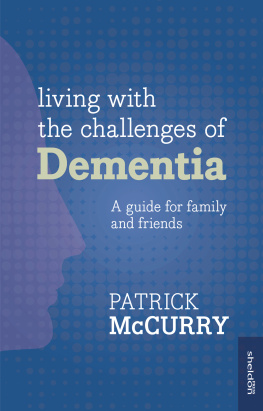John Dunlop - Finding Grace in the Face of Dementia
Here you can read online John Dunlop - Finding Grace in the Face of Dementia full text of the book (entire story) in english for free. Download pdf and epub, get meaning, cover and reviews about this ebook. year: 0, genre: Religion. Description of the work, (preface) as well as reviews are available. Best literature library LitArk.com created for fans of good reading and offers a wide selection of genres:
Romance novel
Science fiction
Adventure
Detective
Science
History
Home and family
Prose
Art
Politics
Computer
Non-fiction
Religion
Business
Children
Humor
Choose a favorite category and find really read worthwhile books. Enjoy immersion in the world of imagination, feel the emotions of the characters or learn something new for yourself, make an fascinating discovery.
- Book:Finding Grace in the Face of Dementia
- Author:
- Genre:
- Year:0
- Rating:4 / 5
- Favourites:Add to favourites
- Your mark:
- 80
- 1
- 2
- 3
- 4
- 5
Finding Grace in the Face of Dementia: summary, description and annotation
We offer to read an annotation, description, summary or preface (depends on what the author of the book "Finding Grace in the Face of Dementia" wrote himself). If you haven't found the necessary information about the book — write in the comments, we will try to find it.
John Dunlop: author's other books
Who wrote Finding Grace in the Face of Dementia? Find out the surname, the name of the author of the book and a list of all author's works by series.
Finding Grace in the Face of Dementia — read online for free the complete book (whole text) full work
Below is the text of the book, divided by pages. System saving the place of the last page read, allows you to conveniently read the book "Finding Grace in the Face of Dementia" online for free, without having to search again every time where you left off. Put a bookmark, and you can go to the page where you finished reading at any time.
Font size:
Interval:
Bookmark:
Thank you for downloading this Crossway book.
Sign-up for the Crossway Newsletter for updates on special offers, new resources, and exciting global ministry initiatives:
Crossway Newsletter
Or, if you prefer, we would love to connect with you online:
|
|
|
|
The patient is not the only victim of this dreadful disease; caregivers are just as much, if not more, affected by it. As we must understand what it is like to be the victim, so we must understand what it is like to care for a person with dementia. As we understand more of the caregiving experience, we will develop some compassion for caregivers. We will see that providing loving care to a victim of dementia is one of the key ways in which this complicated disease can honor God.
Challenges for Caregivers
Just as there is a wide range of the ways victims experience dementia, there is a wide range for the ways it impacts the lives of the caregivers. Earlier we talked about the good, the bad, and the ugly for those with dementia; so it is for their caregivers. You may find this chapter difficult, for I am not painting an altogether happy picture of caregiving. But dont be discouraged! In the next chapter we will talk about some ways to make it better and to see caregiving the way God sees it.
Denise is a good example of what its like to be a caregiver. As Dave progressed through his dementia, I was impressed that he actually looked fairly well. Dave appeared rested and no longer cried as he had earlier; however, Denise looked increasingly fatigued and stressed. On the occasions when Dave did get upset, Denise would reach out to touch him. It seemed rather sweet and romantic, and he would visibly relax at her touch, but Denise would utter an almost imperceptible sigh, with a look of frustration on her face. I began to notice that she was rather sharp in her responses to Dave.
During that same period, I saw her more frequently at the office for various minor illnesses, viral infections, and stomach problems. She would tell me how Dave clung to her most of the time, catnapped a lot during the day, and wandered around the house at night. She scarcely had a moment to herself, was suffering from sleep deprivation, and was falling into a severe depression. She told me several times that she had asked her children to come stay with Dave so she could get away for a while, but they always had other things to do. Sympathetic to her situation, her pastor put a message on the churchs electronic bulletin board, asking for others to stay with Dave for short periods, but none offered the help she desperately needed.
Denises experience is all too common. Consider the statistics on caregiving. There are approximately eight million Americans with dementia (five million with Alzheimers). Of these roughly 70 percent live at home, and 75 percent are cared for by their families or friends. Most often, the caregiver is either the spouse or the daughter or daughter -in-law. Serving a loved one with dementia is never what anyone would choose, yet caregivers often serve at great personal sacrifice.
Challenges from the Patient
The challenges faced by caregivers vary from day to day and from one case to another. Though there is no stereotypical case of dementia, we can identify some of the behaviors that typically challenge caregivers.
Anger . Patients with dementia can exhibit anger, particularly with the ones they depend upon the most. I have often wondered why. Perhaps it is the contempt of familiarity. Perhaps the caregivers presence reminds the patients of how dependent they are, and they resent that. Perhaps they are tired of being told what to do, for, like any of us, they do not like being bossed around. Perhaps there is difficulty adjusting to role reversals between parent and child or within a marriage. Perhaps it is all these and other reasons as well. From a personal standpoint, my mother -in- law was always pleasant to me, but she vented her anger on my wife, Dorothy, who loved her dearly and cared for her so well. Dorothy described her mothers behavior with others as her social behavior.
Vacillation . Day -to- day change in patients with dementia can be frustrating for caregivers. Patients may have good days and behave almost normally, but on other days they are totally confused, uncooperative, and downright cantankerous. Provoked caregivers wonder, Why couldnt she do today what she did so well yesterday? Conversely, there are times when the patient seems to have some level of control. I recall two situations in which two loving daughters cared for their mothers, both of whom had moderate dementia and were increasingly uncooperative and difficult to manage. Both daughters had brothers who lived far away and rarely had contact with their mothers. In each case the sisters pled with the brothers to come and visit to better understand what was going on. Thankfully, the brothers finally came, but in both cases, the mothers put on their best behavior during the visit, leading the brothers to believe that their sisters were blowing the problem out of proportion. Someone with dementia can do well for a brief visit from a loved one but cannot keep it up long -term. It takes a lot of effort to force a deteriorating mind to keep up its social behavior. Additionally, the sons, during their short visit, did not have to give the sort of care the sisters provided on a daily basis that their mothers found so demeaning.
Lack of appreciation . Persons with dementia rarely acknowledge the sacrifices their loved ones make for them. It is truly a thankless job. It is not just those with dementia who rarely say thank you, but also other family members who are not carrying their share of the load. They will fail to express appreciation if they assume the caregiver is simply doing her duty.
Apathy. Those with dementia often lack the motivation to get up and get going, which can prove frustrating for caregivers.
Loss of inhibition. We all think bad thoughts occasionally and have impulses to do what we would otherwise recognize as inappropriate, crazy, or even evil. Fortunately, a healthy brain recognizes those thoughts as wrong and dismisses them. I recall with horror my friend Hugo, a quiet, unassuming academic, who, for no good reason, drove through four stop signs. When pulled over by the police, he argued that what hed done was perfectly safe since there were no cars coming. Were it not for a call to his wife and her explanation of his decreased mental capacity, his lack of inhibition would have resulted in arrest. It did, however, end his days of driving. The patients lack of inhibition can be embarrassing to the caregiver, which in turn can limit social encounters for the patient, thereby contributing to social isolation for the caregiver.
Slowness. Everything a caregiver does with a dementia patient takes more time than expected. Whether it is dressing, eating, or going to the bathroom, the caregivers patience is required.
Accusations. Dementia patients can easily assume that problems stemming from their dementia are the fault of someone else. Unable to find a wallet or purse, the caregiver is accused of stealing.
Communication. It can be painfully difficult to grasp what those with dementia are trying to say and to make sure they understand what you are saying to them.
Shadowing . As we noted earlier, those with dementia can feel insecure and fearful if left alone. This dire need for security makes them want to know their loved one is close by, which rarely allows the caregiver a moment of solitude.
Next pageFont size:
Interval:
Bookmark:
Similar books «Finding Grace in the Face of Dementia»
Look at similar books to Finding Grace in the Face of Dementia. We have selected literature similar in name and meaning in the hope of providing readers with more options to find new, interesting, not yet read works.
Discussion, reviews of the book Finding Grace in the Face of Dementia and just readers' own opinions. Leave your comments, write what you think about the work, its meaning or the main characters. Specify what exactly you liked and what you didn't like, and why you think so.
















